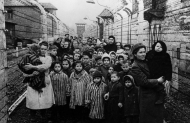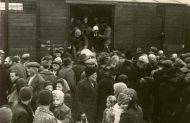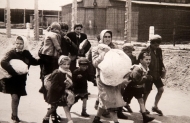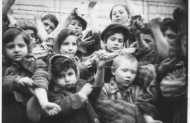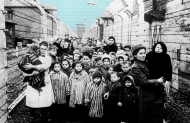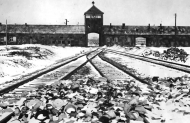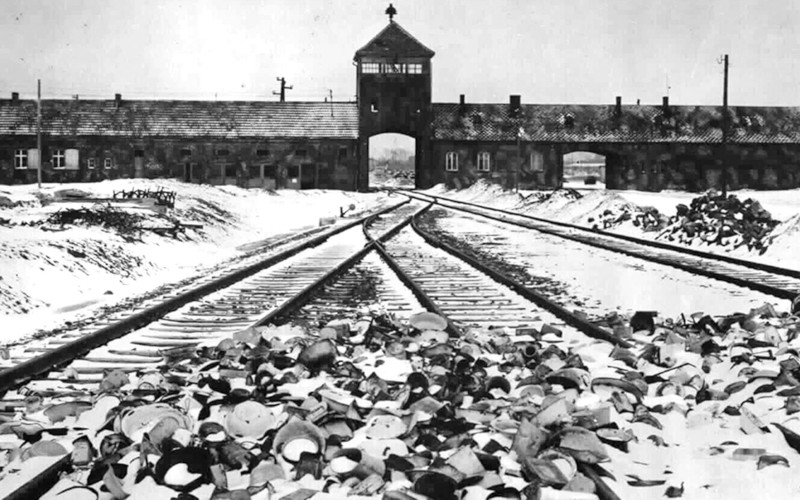
The German concentration camps of the Second World War are remembered today only with shudder and horror. These cruel, merciless times have shown the whole world how easily self-love overcomes humanism in a person. But if for some these times became a test of humanity and many could not stand it, others, finding themselves in difficult circumstances, showed remarkable fortitude, dignity and courage.
The events of those years did not bypass any Soviet family, including our family. My great-grandmother Maria Alexandrovna Yakhanova told me about her life. Much of that story has sunk into oblivion, lost in the halls of great-grandmother's memory or completely disappeared in the abyss of her thoughts and memories, but what she managed to tell me before her death, I would like to share with others.
In 1941, when the war had just begun, the little girl Masha and her mother were taken to Poland, to the Auschwitz concentration camp. Everyone knows the name of this camp today, it is a symbol of the Holocaust, it reminds us of the moral decline and crisis of humanism that occurred in Europe in the 1930s and 1940s, it is synonymous with death, horror and genocide.
How did it all these begin?... It all started in early June 1941, when Masha was only seven years old and she, along with her whole family, came to rest with relatives in the Crimea. Masha finished her first class with excellent marks, and she was entitled to such holidays full of sun, sea and childish happiness. But a quiet family vacation was interrupted on June 22, when it was announced over the loudspeaker that German troops had crossed the border of the USSR. The war has begun. Father and brother were immediately taken to the front, and they themselves wanted to defend the honor of the Motherland and protect their family. Masha's brother Vitalya studied at the Kronstadt Naval School. Her father was the commander of an artillery regiment in the defense of Sevastopol. Mom stayed with Masha ... At the end of August, the occupation of Crimea began, and later, mother and little Masha were seized and taken to a concentration camp.
Great-grandmother omitted a lot in her story, she simply did not remember much, and did not want to remember, these memories were too traumatic for her, she did not name the reasons for their stay in the camp. Perhaps they suffered due to the fact that their father was a colonel and, moreover, participated in the defense of the most persistent, as it turned out, port of Sevastopol, or Polish origin played a role in this.
On the train to the camp, Masha and her mother travelled standing up: it was impossible to lie down or sit down because so many people were crowded into the carriage. The chaos and confusion on the train was comparable to the Babel pandemonium, when people who were proud and angry with God, deprived of a common language and the ability to understand each other, could only create confusion and gloom all around them. In the Second World War, the world was once again in the "Babel pandemonium".
When the train arrived at the camp, all the people, exhausted from thirst, hunger and the difficult conditions of the journey, were thrown out of the wagons like sacks. All the things they had managed to take were taken away immediately, they said they would return them after they had inspected them, but in fact they were taken away irretrievably. When everyone was unloaded, they started to check people's papers to see what nationality they were of. Maria Alexandrovna often said:
“After determining the nationality, everyone was divided into groups. There was a large group of Jews, they were mercilessly shot, regardless of what kind of person was before: bad, good, poor or rich. They (the Germans) hated them (the Jews)."
After the execution, the children were taken away. It was only after being settled in beds that rumors spread that those whose children were taken away (especially women) were immediately undressed, driven into a basement without windows and killed with Zyklon B gas, and their bodies were burned. Most of these poor fellows were Jews, Poles, Greeks, Gypsies, homosexuals, etc. Those people who were not killed were starved and overworked, tortured, experimenting on them. A terrifying collection of women's hair, clothes, glasses, suitcases and other things left over from the murdered prisoners is more eloquent than a poet and brighter than an artist, describes Auschwitz as a center of mass executions.
The children were separated from their parents and did not meet with them, at first, they screamed, they wanted to see their mothers, but all their prayers were in vain, they only irritated the camp employees, who became even more callous to the children because of this. Children were sent in turn to pump blood for German soldiers who had suffered in battles. Little Masha knew nothing about her mother. Since the mother herself did not want to endanger either her daughter or herself, she did not succumb to unnecessary emotions and did not make dangerous sorties.
On January 27, 1945, Soviet troops liberated the camp, and only on that day, ten-year-old Masha saw her mother for the first time in these years:
“I thought my mother had been killed a long time ago, because there was no information about her. And when I happened to see my mother walking exhausted in the crowd, I tried with all my strength and willpower to run to her. It was the best day of my life!"
But the sorrows that then came to every Soviet house, without exception, did not leave my grandmother: the family found out that Vitalya had died, saving the captain of the ship.
The camp trials, imprisonment, constant expectation of death, the death of my brother - all these shocks have long stirred up my great-grandmother's twisted soul... For a long time, her family tried not to indulge in these memories, it seemed that everything should be done to preserve the happiness of the present day from the trauma and anxieties of the past. But my curiosity and I were growing up, and it was not satisfied with speeches at 9 May celebrations and stories from history teachers, it demanded living testimonies of the war...
Seeing my genuine interest, after decades of silence, my great-grandmother told me about her life. Her story made me think about the limits of human cruelty! How can I measure the extent of human inhumanity? The meters of the camp wire, restricting the freedom, aspirations and dreams of its prisoners? By the size of the graves in the death camps or the number of humans remains charred in them? World War II proved that man is a bad pupil, not learning the lessons of the past, but it also demonstrated how greedily he clings to life, as some still managed to survive the apocalyptic hell of war. Even under such circumstances, people, seemingly desperate and having lost all hope, find the strength to persevere and, if freed, find the courage to live on.
I have just begun to realize how much it hurt her, my great-grandmother, but she was able to find strength in herself and start life from scratch. Her story, her childhood riddled with ordeals of the war made me more reverent about her, the events of that era, witnesses of the tragedies of the past and become more sensitive and tolerant.
Anastasia Kokryatskaya, Nizhny Novgorod (Russia)



